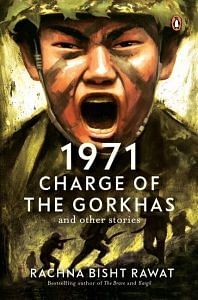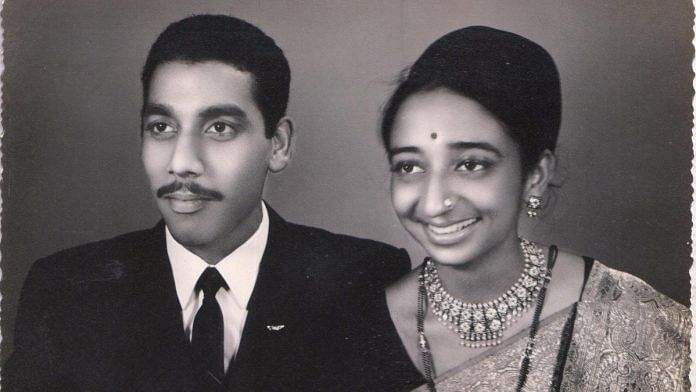August 2021
Munirka Vihar
Delhi
‘Paal le ik rog nadan zindagi ke vaaste
sirf sehat ke sahare umr to kat ti nahin.’
Frail, grey-haired and neatly dressed in a white salwar kameez and dupatta, seventy-two-year-old Damayanti Vijay Tambay leans back in her easy chair and recites these lines to me. It has been fifty years since her fighter pilot husband left the house looking affectionately into her eyes with an ‘Aata hun’. She is still waiting.
Finding out what happened to him is the rog of her life, she says. ‘It is my fitoor, my obsession, it gives meaning to my life.’ I see no frustration or helplessness in her eyes. Just sadness and steely resolve. Her courage is no less than her husband’s, who went to fight for his country.
The day Flt Lt Vijay Tambay’s plane crashed, twenty-two-year-old Damayanti was sitting alone at home. The previous night had been traumatic. She had spent most of it standing in the deep, moist, ant-infested trench that had been dug out in front of the house as a bomb shelter. In her pocket was a steel spoon and a thick roll of cotton. Tambay had told her that bomb attacks often jammed the jaws of victims, and keeping something between the teeth could prevent that. ‘Air-raid sirens pierced the silence of the night, ack-ack guns boomed, and I just stood there trembling with cold and fear,’ she remembers. In the afternoon, some air force personnel rang the doorbell. Not mentioning the crash, they told her that it might be best if she went back home to stay with her parents. ‘I thought maybe Vijay wanted that, so I packed my suitcase, locked up the house and walked down to the railway station that was about 2 km from my house.’ Boarding the Kalka Mail, which made a two-minute stop at Ambala, Damayanti spent the night in the first-class corridor because no one wanted to open their coupe for her. When some passengers got down at Delhi the next morning, she got a place to sit and eventually reached Allahabad, where her parents lived.
On the night of 6 December, she was absent-mindedly fiddling with the radio when suddenly her blood froze. Radio Pakistan was announcing the names of Indian prisoners of war (POWs). Flt Lt Tambay was one of the names called out.
On 8 December, a telegram arrived, confirming the news that he was missing in action. It was from the Indian government. ‘Very selfishly, my first emotion was of relief. I thought he would not have to fight any more. And since his name had been publicly announced by Pakistan, I believed he would be repatriated. The thought that he might never come back just did not cross my mind,’ says Damayanti.
While both the Indian Air Force and the Pakistan Air Force appear to believe that Tambay did not survive the crash, Damayanti feels her husband baled out of his burning aircraft and was taken prisoner. She starts to tell me why, but I want to know Vijay Vasant Tambay better, so I implore her to start from that breezy winter morning in Delhi when a dashing fighter pilot drove into her life in a green Fiat car and swept her off her feet. ‘A bottle-green Fiat,’ she corrects me gently and, with an endearing smile, goes on to describe the eighteen-month romance that has sustained her for a lifetime.
***
Also Read: The tragic love story of Indian Army Major Shashidharan and Trupti Nair
In 1983 and 2007, two trips were organized where the relatives of missing Indian soldiers were taken to Pakistan and asked to search for their people. Both times they went with a lot of hope but returned disheartened. Damayanti says that in 1983, P.V. Narasimha Rao, who was the external affairs minister, met relatives of six POWs who were going to Pakistan and briefed them personally in Hyderabad House, Delhi. ‘He told us that this was the first time that consular access was being given and both countries had agreed to exhibit their POWs to visiting relatives. “You take back yours while we will take back ours” was the agreement.’
Rao explained to them that both countries needed a face-saving approach. In this case, it would be through names. Damayanti says, ‘“You will need to agree that your people are there under assumed names,” he told us. “So if you find your loved one, you will say, Ye Vijay Tambay hain par inhone apna naam Mohammad Yusuf bataya tha, which is why he could not be identified earlier.” He told us this drama would have to be played out and we agreed. Everything was agreeable to us as long as we got our people back.’ The deal was that Pakistan would repatriate forty-five people and India would repatriate thirty.
‘We went with so much hope, but the day we reached Lahore, the papers carried the news that India had gone back on its word. Instead of thirty, only three prisoners were shown to the visiting group from Pakistan,’ says Damayanti. ‘We knew right then that our visit was going to be futile now. They would surely retaliate and not show us our people.’ The next day, when the Indians were taken to Multan Jail, as soon as the jailer saw her, he said, ‘Mrs Tambay, I am sorry, Tambay is not here.’ Later, the prisoners they met told them that their people had been hidden and would not be produced. The team returned to India disappointed. They could not find even one of their soldiers.
In June 2007, fourteen next of kin of the missing people were again sent to Pakistan. This time they were on a fifteen-day tour that received worldwide media attention. This was the first time that the two countries that had been at war were making a humanitarian gesture, and both governments publicized it in a big way. The then defence minister, A.K. Antony, told the visiting team, ‘We will pursue this till we find the truth. Don’t call them POWs, call them missing in action.’ The fourteen boarded an Indian Airlines flight to Lahore on 1 June with a lot of expectations, even though it had been thirty-five years since the war. They visited multiple jails all over Pakistan but had to return disappointed. At each jail, they were only allowed to interact with the jailer and accept his statement on whether any Indian prisoners were being held there or not. They were not allowed to visit jail hospitals, where prisoners who had lost their minds were kept, or even check military detainees. At no point were they allowed to see prisoners face to face. ‘It was a useless exercise,’ says Damayanti. ‘It was quite evident that the governments were making an effort to end our search without any genuine intention to help.’
***
Despite all these disappointments, Damayanti has not given up. She says she always believed he would come back. ‘The thought of marrying again never ever crossed my mind.’ Now, she says, she has reconciled to the idea that he may never return. ‘But I still want to know what happened to him. For our own official machinery he is just another file number. They are ready to go along with whatever Pakistan tells us. They are not personally involved like I am. For me, he was everything and vice versa. If I don’t look out for him, who will?’
Also Read: ‘Your service to the war changed my life’ — The love story of an Indian man in the British army
***
It is time to leave. I want a picture with her but since she lives alone, there is no one to take it for us. I tell her I’ll take a selfie. ‘Aata hai tumhe? Humein toh nahi aati ye naye zamane ki baatein,’ she says. I turn my cellphone camera on selfie mode and set it up on the dining table. Guiding her to her favourite chair, I set the timer and come back to stand behind her. She is sitting still as a statue, looking at the numbers flashing on the screen. Four. Three. Two. One. ‘Smile,’ I whisper in her ear. The shutter clicks. ‘Did you smile?’ I ask. ‘I did,’ she replies, her eyes sparkling like an incredulous child’s. I put my arms around her and give her a hug. And then, with a piece of barfi that she insists I must eat, I sprint downstairs to meet the driver of my cab.
As I drive back home, my thoughts stay with the young fighter pilot who had walked across to his Su-7 with a swagger at Amritsar airbase fifty years ago. I wonder if he still lives in some jail in Pakistan, wrinkled and withered, his spirit broken by torture, loneliness and time. Does he stare with vacant eyes from behind the iron bars of a dark cell? Does he move in chains, his ears now accustomed to the clanging of metal at every step? Does he spend his days sitting alone and forgotten, with cavities in his teeth and hair that has long turned grey and matted? Or has he lost his mind and is screaming expletives at passers-by, not knowing any more where that anger comes from?
My heart sinks at the thought of how many brave soldiers are cruelly shackled away in foreign lands with fading memories of loved ones they will never see again. ‘When I visited the prisons, I saw how prisoners were treated. I saw old men with chained ankles being taken to see their relatives from across a barrier,’ Mrs Tambay told me. ‘Tab ye laga, I hope he was never alive to suffer this. Aise jeevan ka kya fayda.’ Her sad eyes shall haunt me for a long time. We say we won the 1971 war. But does that victory mean anything at all when we could not stand up for the soldiers who went to fight for us?

This excerpt from 1971: Charge of the Gorkhas and Other Stories by Rachna Bisht Rawat has been published with permission from Penguin Random House India.



